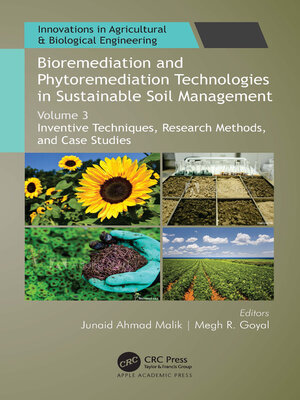Bioremediation and Phytoremediation Technologies in Sustainable Soil Management
ebook ∣ Volume 3: Inventive Techniques, Research Methods, and Case Studies · Innovations in Agricultural & Biological Engineering
By Junaid Ahmad Malik

Sign up to save your library
With an OverDrive account, you can save your favorite libraries for at-a-glance information about availability. Find out more about OverDrive accounts.
Find this title in Libby, the library reading app by OverDrive.



Search for a digital library with this title
Title found at these libraries:
| Library Name | Distance |
|---|---|
| Loading... |
Phytoremediation has evolved into an important tool to improve the bioremediation process since it is an innovative green technology that uses a wide variety of plants to remediate radioactive metals and elements, organics, and chemicals from soil, sediment, surface water, and groundwater environmental pollutants. Together, bioremediation and phytoremediation technologies provide an effective approach to contaminant abatement.
Volume 3 of the four-volume set identifies and draws a fresh image of existing developments in theoretical and functional implementation systems from recent scientific research studies that consider different facets of bioremediation. It also discusses the latest technology and prospects of new soil bioremediation technology and analyzes their domains, along with their associated challenges and consequences.
Other volumes in the 4-volume set:
Together, these four volumes provide in-depth coverage of the mechanisms, advantages, and disadvantages of the bioremediation and phytoremediation technologies for safe and sustainable soil management. The diverse topics help to arm biologists, agricultural engineers, environmental and soil scientists and chemists with the information and tools they need to address soil toxins that are a dangerous risk to plants, wildlife, humans and, of course, the soil itself.







